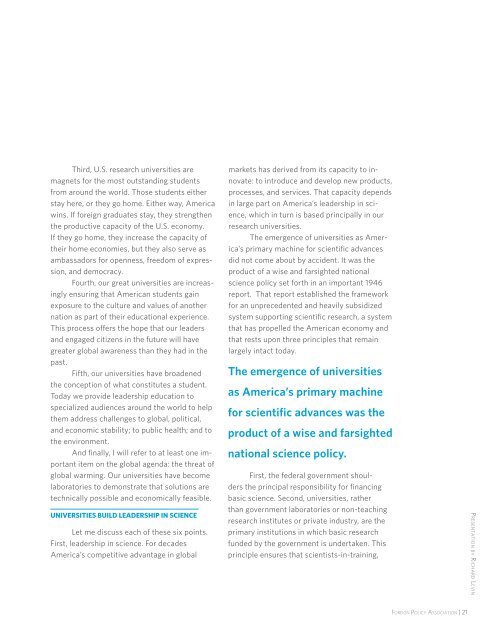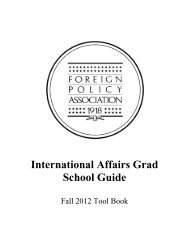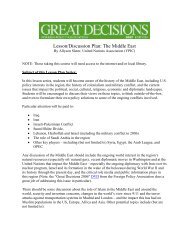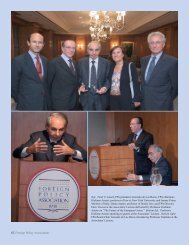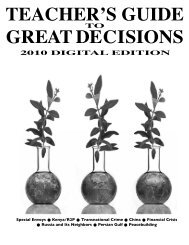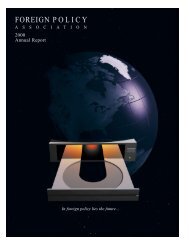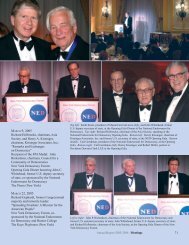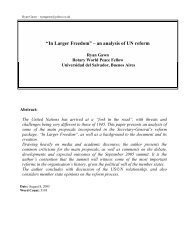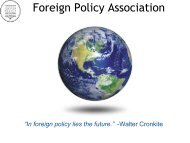Celebrating 90 Years - Foreign Policy Association
Celebrating 90 Years - Foreign Policy Association
Celebrating 90 Years - Foreign Policy Association
Create successful ePaper yourself
Turn your PDF publications into a flip-book with our unique Google optimized e-Paper software.
Third, U.S. research universities are<br />
magnets for the most outstanding students<br />
from around the world. Those students either<br />
stay here, or they go home. Either way, America<br />
wins. If foreign graduates stay, they strengthen<br />
the productive capacity of the U.S. economy.<br />
If they go home, they increase the capacity of<br />
their home economies, but they also serve as<br />
ambassadors for openness, freedom of expression,<br />
and democracy.<br />
Fourth, our great universities are increasingly<br />
ensuring that American students gain<br />
exposure to the culture and values of another<br />
nation as part of their educational experience.<br />
This process offers the hope that our leaders<br />
and engaged citizens in the future will have<br />
greater global awareness than they had in the<br />
past.<br />
Fifth, our universities have broadened<br />
the conception of what constitutes a student.<br />
Today we provide leadership education to<br />
specialized audiences around the world to help<br />
them address challenges to global, political,<br />
and economic stability; to public health; and to<br />
the environment.<br />
And finally, I will refer to at least one important<br />
item on the global agenda: the threat of<br />
global warming. Our universities have become<br />
laboratories to demonstrate that solutions are<br />
technically possible and economically feasible.<br />
UNIVERSITIES BUILD LEADERSHIP IN SCIENCE<br />
Let me discuss each of these six points.<br />
First, leadership in science. For decades<br />
America’s competitive advantage in global<br />
markets has derived from its capacity to innovate:<br />
to introduce and develop new products,<br />
processes, and services. That capacity depends<br />
in large part on America’s leadership in science,<br />
which in turn is based principally in our<br />
research universities.<br />
The emergence of universities as America’s<br />
primary machine for scientific advances<br />
did not come about by accident. It was the<br />
product of a wise and farsighted national<br />
science policy set forth in an important 1946<br />
report. That report established the framework<br />
for an unprecedented and heavily subsidized<br />
system supporting scientific research, a system<br />
that has propelled the American economy and<br />
that rests upon three principles that remain<br />
largely intact today.<br />
The emergence of universities<br />
as America’s primary machine<br />
for scientific advances was the<br />
product of a wise and farsighted<br />
national science policy.<br />
First, the federal government shoulders<br />
the principal responsibility for financing<br />
basic science. Second, universities, rather<br />
than government laboratories or non-teaching<br />
research institutes or private industry, are the<br />
primary institutions in which basic research<br />
funded by the government is undertaken. This<br />
principle ensures that scientists-in-training,<br />
FOREIGN POLICY ASSOCIATION | 21<br />
PRESENTATION BY RICHARD LEVIN


